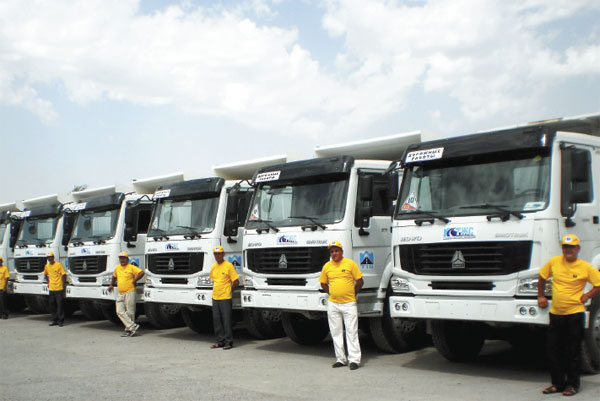|

Sinotruk sold heavy duty trucks to the Republic of Kazakhstan. Photos Provided to China Daily
|
China National Heavy-Duty Truck Group Co, the nation's largest heavy truck exporter, is striving to expand its business into overseas high-end markets and make itself a top player in the sector worldwide.
"After exploring overseas markets for over ten years, we have made sound progress in developing countries and now are trying to tap into the high-end markets in developed countries and regions such as Ireland, New Zealand and Singapore," said Cai Dong, general manager of the Shandong-based company, also known as Sinotruk.
"If we are to become a global commercial automobile giant we need to venture into developed countries and make highend vehicles," Cai told China Daily.
"Sinotruk has developed a raft of competitive products, which can rival those manufactured by the world's leading truck makers in quality and operation," he added.
Sinotruk was established in 1956 and was a pioneer in the development of heavy-duty truck manufacturing in China. The company, which previously concentrated on heavy-duty trucks, has developed a full range of commercial vehicles including heavy, medium and light-duty trucks, vans, special-purpose vehicles and construction machinery.
Despite shrinking domestic and overseas demand, Sinotruk still secured orders for 176,000 vehicles last year, up by 9.94 percent from the previous year.
Sinotruk sold 34,000 vehicles abroad, contributing to almost 20 percent of its total sales volume and making the company the largest exporter of heavy trucks in the country for 10 consecutive years. Revenue from overseas sales amounted to 9 billion yuan ($1.45 billion) and accounted for about 13 percent of the total.
"We realized we had to become global more than ten years ago when few China made heavy trucks were being exported," Cai said. He added that the company first put forward a globalization strategy in 2004.
The company currently exports vehicles to 96 countries and regions and has six overseas branches in Southeast Asia, the Middle East, South America, Russia and Africa. "Generally we first enter the less developed overseas markets because people there are not focused on well-known Western brands and are attracted to products with comparatively low prices," Cai said.
He noted that the company secured sound market shares in almost all developing countries and more than 30 of its 96 export markets are in Africa, where about 15,000 vehicles are sold every year.
"After gaining brand recognition in these areas, we are now prepared to penetrate into developed markets such as the United States and the European Union, using our high-end products," Cai said. "It is a significant step for sustainable growth in the long run." To achieve this aim, the company has built technical partnerships with top international brands including Steyr in Austria and Mann in Germany.
In 2009, Europe's leading heavy commercial vehicle maker MAN SE, owner of the Mann brand, bought a 25 percent share and one stock share in Sinotruk Hong Kong and signed an agreement to transfer some advanced technologies to the Chinese truck maker.
"Teaming up with global heavyweights enables us to not only introduce advanced technologies and management experience, but also greatly improve our own R&D capability," said Yu Tianming, director of Sinotruk's State-level technology research center, the only one of its kind in China.
The company now holds the largest number of patents among Chinese vehicle makers, with 2,980 patents licensed in total.
Its product lineup for heavy trucks alone grew from one series and 78 variants in 2001 to nine series and more than 3,000 variants today.
Yu said the company has developed world-renowned brands like Sitrak, Howo, Steyr and Hohan, which are respectively designed for high-end, medium-tier and price-sensitive consumers.
"The Sitrak series of heavy trucks, which were jointly developed by Sinotruk and MAN SE, have reached the international advanced level and become one of the company's best sellers," said Liu Wei, vice general-manager of Sinotruk in charge of overseas business.
"With high performance, fuel efficiency and driver comfort, the model is expected to rival foreign high-end brands in the domestic market and help Sinotruk extend its sales network to developed countries," Liu said.
Localization strategy
As well as high-quality products and proactive marketing strategies, Liu emphasized sound after-sales services and localization strategies as key elements of Sinotruk's success in overseas markets.
The company built more than 400 service outlets and 300 parts dealerships across the world. "Almost 1,000 technical and sales personnel are sent regularly to our exporting countries to give our customers training on using the vehicles and help them maintain their equipment," Liu said.
"They are sponsored by the company to learn the local languages and cultures to better service our customers," he added.
The company is speeding up construction of overseas assembly plants to further boost its competitiveness by saving transport and labor costs.
In May 2014, Sinotruk signed a $100-million deal with Africa's industrial giant Dangote Group for a new assembly plant to produce trucks in Lagos, Nigeria.
The plant is the eighth Sinotruk has built abroad and is expected to assemble 10,000 heavy trucks a year when complete.
"Other assembly plants are planed to be built in Kazakhstan to embrace the nation's ambitious 'One Belt and One Road' initiatives," Liu said.
Sinotruk is also stepping up efforts to develop environmentally friendly heavy trucks aimed at high-end markets.
The company produced engines that meet the Euro V emission standards in 2011 and got orders to export Euro V heavy-duty trucks to Brazil, Hong Kong and Taiwan.
"We are now working to develop Euro VI engines. Although this emission standard won't be implemented in domestic markets in the next few years, we have to do so to fight for market shares in developed countries," Liu said.
Sinotruk aims to increase the share of its exports of vehicles to 30 percent of the total, up from the current 20 percent, he said.
wangqian2@chinadaily.com.cn